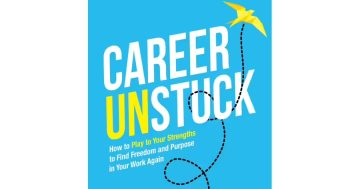Jared Lindzon* says being unhappy at work doesn’t just affect your workdays; it could also be impacting your sleep, happiness and long-term health.

Photo: kieferpix
Considering how much time is spent at work, it should come as no surprise that those who are more satisfied with their job report being happier overall.
But the benefits of being a satisfied employee may extend further beyond the workplace than previously thought.
Employee satisfaction has been associated with lower turnover rates, increased customer loyalty, and employee productivity, as well as better business results overall.
But studies now suggest long-term health benefits for those who love what they do.
Workplace satisfaction is believed to affect mental health, physical health, concentration and focus, and the ability to manage finances and personal relationships outside of work.
It may even help you live longer.
In contrast, a study conducted by researchers at Ohio State University found that those who are dissatisfied with their jobs in their twenties and thirties were more likely to have problems with sleep, anxiety, and depression later in life.
Satisfied employees sleep better
Workplace unhappiness can affect your life more immediately, too.
A recent survey by Best Mattress Brand also found that those who are dissatisfied with their work are also far more likely to report dissatisfaction with their sleep.
Those who don’t enjoy their work were not only more likely to report problems falling and staying asleep, but also less time and energy to enjoy themselves outside of work, less energy and time to fulfil personal responsibilities, and less ability to manage personal finances.
“Those dissatisfied with their jobs tend to view their occupation as a burden rather than a place of productivity and growth,” says Andrea Strand, a certified sleep science coach at Best Mattress Brand.
“That viewpoint takes a toll, affecting both mental and physical wellbeing.”
Those who are satisfied with their jobs, meanwhile, were more likely to report having more energy, focus, and drive after work, more energy to spend with friends and family, and are more likely to be adventurous and try new things.
“With this positive mindset, a person is likely to make better decisions regarding their health; they may go to the gym, make healthier food and beverage choices, and develop smarter sleep habits,” says Strand.
“Additionally, satisfied employees have a more positive outlook on life and reported a much higher percentage of keeping their commitments outside of work.”
Unemployment is a real killer
Those who are dissatisfied with their jobs may experience some negative health repercussions, but they pale in comparison to the damage caused by unemployment.
Unemployment results in a 20 per cent decrease in overall happiness and wellbeing, according to the World Happiness Report.
“The striking fact is that over time, people simply do not adapt to being unemployed,” says Jan-Emmanuel De Neve, an Associate Professor of Economics and Strategy at Oxford University and Associate Editor of the World Happiness Report.
“If you are without a job, your life satisfaction is permanently lower.”
Research has found that even those who re-enter the workforce after a sustained period of unemployment never return to their previous levels of happiness and wellbeing.
“You don’t adapt over time; even when you regain employment, there’s a permanent scar as far as wellbeing,” said De Neve.
Satisfied employees (might) get sick less often
While having a job can be a significant factor in overall health and wellbeing, workers won’t reap most of those benefits unless they’re actually engaged in their work.
“We humans are a difficult species,” says De Neve.
“It’s important to have a job, but once we have a job, we’re not that engaged with it.”
According to De Neve’s research, those who report being engaged in their work actually take fewer sick days than those who aren’t.
De Neve cautions, however, that the finding doesn’t necessarily mean those who are dissatisfied with their work are less healthy overall — or at least not to the extent that the findings imply.
“There is a strong correlation between job satisfaction and sick days taken throughout the year, but that could mean one of two things,” he says.
“Either people are lying less about being sick, or they’re actually less sick if they’re happy.”
Longevity effects are less clear
So, do the significant mental and physical health benefits associated with workplace satisfaction mean that happy workers live longer?
While researchers have made an effort to answer that question, the jury is still out on the link between workplace engagement and longevity.
A study published in the Journal of Epidemiology and Community Health found that people who continue working after the age of 65 had a roughly 10 per cent increase in their odds of survival for each year they delayed their retirement.
“Our research has been showing for 20 years that the social context of your life is what largely determines how you feel about your life, how happy you are, and how long you’re going to live,” says John Helliwell, Professor Emeritus at the University of British Columbia’s Vancouver School of Economics and Co-editor of the World Happiness Report.
“What’s going on in the workplace is bound to be very important, and continually studies show exactly that.”
While there isn’t yet a well-established link between workplace satisfaction and longevity, Helliwell says his research continually finds such a connection between overall happiness and lifespan, explaining that workplace satisfaction plays a significant role in determining overall happiness.
“I suspect it’s also true, but I haven’t seen a link that’s specific to employees,” he says.
The full report can be accessed at this PS News link.
* Jared Lindzon is a Canadian freelance journalist.
This article first appeared at www.fastcompany.com.








